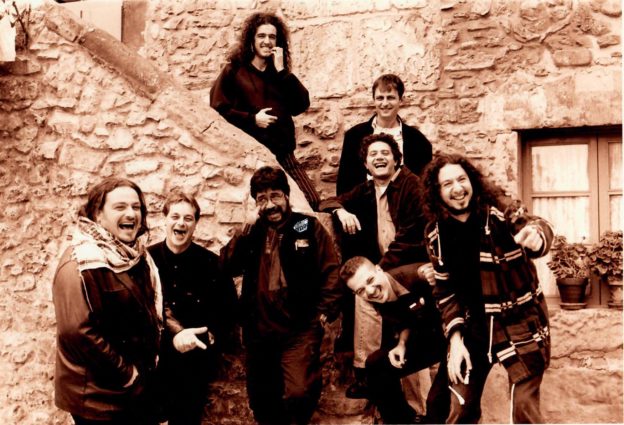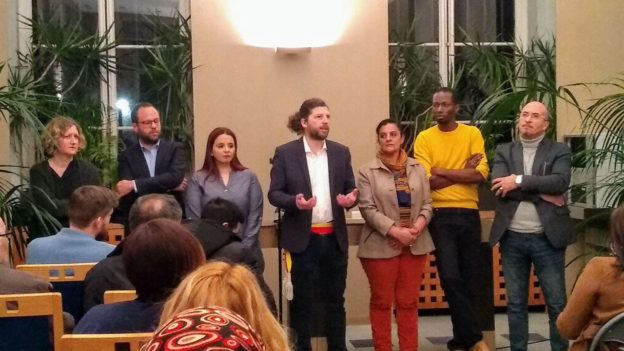I have a story that I feel needs to be shared. It happened three weeks ago, and made me proud to be Belgian.
A friend – I will call her Caroline – got in touch after a silence of several years. We used to work together back in the day, and had become friends. We had stayed in touch, very irregularly, through a common friend, who, like me, lives in Brussels. Caroline herself, who lived in the US when we worked together, was now back to France.
She had another former colleague, a man I will call Malik. Malik is Palestinian, and lives in Gaza with his wife and two children, 4 and 3 years old. You can see where this is going. His house was bombed, twice. His immediate family was unharmed, though some of his nephews, that used to play with his children, are gone.
Malik managed to get his family into Egypt via Rafah. Thanks to Caroline’s invitation, he obtained a tourist visa for the family to travel to the USA. With her help, he tried to obtain political asylum in the USA and Canada. But nothing worked. At the end of the customary three months, the visa was about to expire. So, Caroline’s message told us “Malik has decided to apply for refugee status in Belgium. Can you help?”
It turned out we could, a little bit. Mostly with information, and by giving him someone that he could call, a friendly voice in the New Place.
So in they flew, Malik and his wife and their two children, with a stopover in Brussels and a connecting flight to Cairo. They had a plan, supported by information we could find on the Belgian end: intentionally miss the flight to Cairo, then report to the airport authorities and ask for asylum.
It turns out that Belgium has an “airport track” for asylum seekers, and that it becomes very fast when minor children are involved. Malik and his family were first made to wait, and yes, after a long flight from the US and with two small children that’s not a joke.
But at the end of that wait, the system kicked into gear. The family was put into a car and driven to a building in the airport’s region. They were given the keys to an apartment, some money to buy food and information on where to buy it, and told to get some rest.
As the weekend came around, my girlfriend, who had taken point on the whole Malik initiative, went to meet the family and accompany it on a trip to Antwerp.
The trip was, she reports, very touching. They had a story to tell, and they wanted to tell it. They had photos on their phones: a house shot to pieces. Toys retrieved from the rubble. The missing cousins of the children, who they will never see again (though they have not been told that yet).
But check this out: they had an appointment with the Federal agency which processes asylum requests for the intake interview on the following Monday, less than one week after arrival!
The interview went something like this: the whole family had their photos and biometrics taken and was issued ID cards. After which, the official in charge basically told them: look, the situation is clear. You are from Gaza and cannot go back. Your status as refugee is straightforward and we might not even bother with a second interview. Welcome to Belgium. Here is information about your rights and the support that come with refugee status. See you in five years when you apply for citizenship.
The language was no doubt more formal (I was not there), but that was the gist of it.
It’s going to be difficult for them. Malik is a highly qualified professional, but the truth is many Belgian landlords do not like to rent to refugees. He and the family will have to learn French or Dutch to function in society. But this, by the Gods, is the asylum system working as intended. Belgium is a member state of the United Nations, which voted to adopt the Universal Declaration of Human Rights in 1948 (Belgium voted in favour). So, it is now beholden to it, and that implies offering safe haven to Malik and his family. No ifs, no buts. This is honorable.
And meanwhile my cohousing group is trying to make this a softer landing for the family. Since the group organizes some social event, it is easy to act as a sort-of-peer group for the adults while they find their feet.
Also, someone is organizing a Sinterklaas visit for their children, and maneuvers are in place to involve Malik’s little monsters.
(Because Belgium, we do not care for Santa Claus, and have our own version)
https://en.wikipedia.org/wiki/Sinterklaas
And look, the gods know that Belgium can be gleefully dysfunctional and infuriating at times. Look up “Belgian solution” and you’ll see what I mean. And the Belgian government is so blasé about dysfunctionality that it makes it own jokes about the Belgian government. But underneath it all, there are (some) functioning bureaucracies, and some simple just doing the bloody job, ESPECIALLY if your job is standing up for the underdog and the people in need.
And here, I have to say, I am having a bit of a patriotic moment, and am proud of the country where I chose to make my own stand, and of my fellow Belgians. I was never happier and prouder to have become one of you. Let’s keep doing this. Laten we dit blijven doen. Continuons comme ça. <3

